

A qui appartiennent vos followers et combien valent-ils ? Bloom actions-activities. Alone Together by Sherry Turkle. Joel De Rosnay lors de la 7ème Edition du Congrès LTD Congrès HR' Wifeel. Solerni : Le digital, vivons-le ensemble. Le nouveau Lexique des médias sociaux – En manchettes – Archives. Portail linguistique du Canada www.noslangues.gc.ca Accueil > Le nouveau Lexique des médias sociaux Est-ce que vous gazouillez ?

Avez-vous une appli sur votre téléphone pour consulter votre fil de nouvelles sur Facebook ? Êtes-vous un wikipédiste dans vos temps libres? Les langagiers ainsi que tous les utilisateurs des médias sociaux seront heureux de consulter le Lexique des médias sociaux sur le site Web du Bureau de la traduction. Vous pouvez également tester vos connaissances en jouant au jeu Médias sociaux en français 1 . 21st Century Icebreakers: 11 Ways To Get To Know Your Students with Technology. In honor of the start of a new school year, I am sharing one of my popular posts again with you with a couple of new additions!
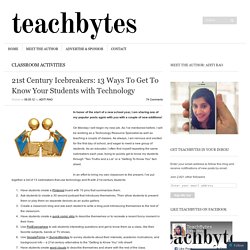
On Monday I will begin my new job. As I’ve mentioned before, I will be working as a Technology Resource Specialist as well as teaching a couple of classes. As always, I am nervous and excited for the first day of school, and eager to meet a new group of students. As an educator, I often find myself repeating the same icebreakers each year, trying to quickly get to know my students through “Two Truths and a Lie” or a “Getting To Know You” fact sheet. In an effort to bring my own classroom to the present, I’ve put together a list of 13 icebreakers that use technology and fit with 21st century students: How To Relax Your Eye Muscles. Access your bookmarks anywhere. Diigo - Better reading and research with annotation, highlighter, sticky notes, archiving, bookmarking & more.
Twitter en formation. Depuis maintenant 6 ans, le Centre for Learning and Performance publie le classement des outils technologiques les plus utilisés dans la formation sur la base d’un vote de près de 600 professionnels dans le monde entier.
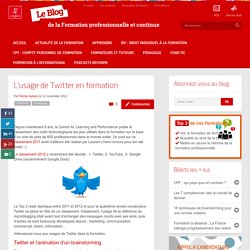
Un post sur ce classement 2011 avait d’ailleurs été réalisé par Laurent (merci encore pour ton œil avisé :-). Le classement 2012 a récemment été dévoilé : 1- Twitter, 2- YouTube, 3- Google Drive (anciennement Google Docs). Le Top 3 reste identique entre 2011 et 2012 et pour la quatrième année consécutive, Twitter se place en tête de ce classement. Initialement, l’usage de la référence du microblogging était avant tout d’échanger des messages courts avec ses amis, puis d’autres se sont beaucoup développés depuis : marketing, communication, commercial, loisirs, information…
Del Harvey: The strangeness of scale at Twitter. Is technology a silver bullet for language teaching and learning? "There is no longer a four-walled classroom," says Dr Cecilia Goria, of Nottingham University's Language Centre.
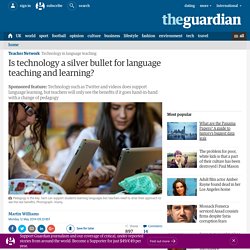
"Teaching and learning now extends beyond that. " Technological innovations have changed language learning radically from the old-fashioned image of pupils learning lists of verbs out of textbooks. Although language teaching has a long history of using tech, dating back to the 1960s, recent developments such as social networking and easy-to-use video cameras have removed many of the limitations. Whereas using tech may have once meant a weekly trip to a computer lab, it can now involve anything, from Facebook and Twitter to podcasts and videos in the classroom.
The question is: should teachers try to evolve their teaching to fit with the latest gadgets, or should they stick to their old ways? Those who use tech say the advantages are obvious. Using tech means that students can now turn to Twitter to use the language, without having to pack the class off on a school trip. Memofon. Les compétences en littératie numérique by Marc André Morais on Prezi.
Using Social Media for Professional Learning. My Three Words for 2011 inspired by Harold Jarche's Networked Learning Model For 2011, my three words are: Seek, Sense, and Share inspired by Harold Jarche’s model for networked learning.
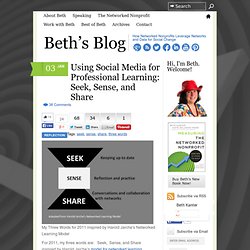
How these words will guide me in 2011: Seek: Seeking is the process of keeping up to date in your field. Over the past decade, the Internet and social media have been one of my primary sources for professional learning. To me, seeking represents the topics or content that I’m curious about and that will help me be more effective at my work as a social media and nonprofit capacity builder and trainer – and blogger. Sense: Sensing is making sense of the information. A lot the products of my sense-making are shared through this blog, flickr, YouTube, and Slideshare – as well as offline through presentations, book and article writing, and facilitating workshops.
Share: This is the process of exchanging resources, ideas and experiences with our networks and collaborating with our colleagues. Introducing the Media Literacy Smartphone. By Jonathan Friesem Ever since the Media Education Lab moved from Temple University to the University of Rhode Island, I was looking for a chance to update the classic media literacy “remote control,” first developed by Renee Hobbs in 1993.
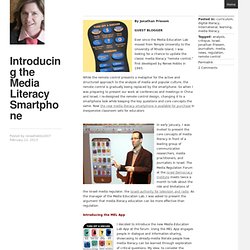
While the remote control presents a metaphor for the active and structured approach to the analysis of media and popular culture, the remote control is gradually being replaced by the smartphone. So when I was preparing to present our work at conferences and meetings in China and Israel, I re-designed the remote control design, changing it to a smartphone look while keeping the key questions and core concepts the same. Now the new media literacy smartphone is available for purchase in inexpensive classroom sets for educators In early January, I was invited to present the core concepts of media literacy in front of a leading group of communication researchers, media practitioners, and journalists in Israel. Introducing the MEL App. Une introduction au PKM par H. Jarche.
Jennifer Golbeck: The curly fry conundrum: Why social media “likes” say more than you might think. L’apprentissage social en ligne pour favoriser l’engagement.